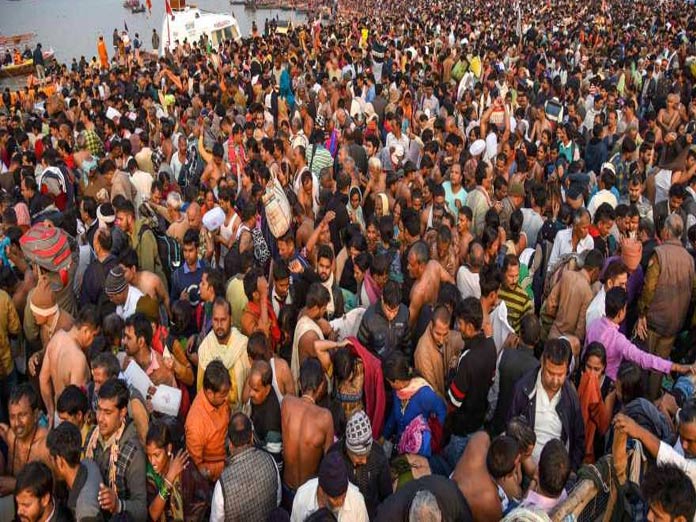Live
- They always want me to win, and now I feel lucky to have been offered a story like ‘Zebra’: Satyadev Kancharana
- ‘Democracy first, humanity first’: PM Modi in Guyana's parliament on two countries' similarities
- PKL Season 11: Telugu Titans register third straight win to top standings
- Is Pollution Contributing to Your COPD?
- NASA Unveils Underwater Robots for Exploring Jupiter's Moons
- Additional Central forces arrive in violence-hit Manipur
- AR Rahman and Saira Banu’s Divorce: Legal Insights into Common Issues in Bollywood Marriages
- 82.7 pc work completed in HPCL Rajasthan Refinery area: official
- Curfew relaxation extended in 5 Manipur districts on Friday
- Tab scam prompts Bengal govt to adopt caution over fund disbursement
Just In

Managing a Kumbh Mela, the worlds largest gathering of religious pilgrims, has never been easy not now, not 100 years ago when India was still under the British rule, Uttar Pradesh was still United Province and people had limited options to commute
ALLAHABAD: Managing a Kumbh Mela, the world's largest gathering of religious pilgrims, has never been easy -- not now, not 100 years ago when India was still under the British rule, Uttar Pradesh was still United Province and people had limited options to commute.
A British-era communication between railway officials and the United Province Lieutenant Governor shows the administration went to the extent of suggesting that prospective visitors be denied railway tickets and only a limited number of special trains be run.
However, this suggestion were rejected by the government of India after some religious groups felt such restrictions could "create deep dissatisfaction in the Hindu community" and indirectly interfere with their religious observance.
A letter dated November 8, 1917, from the then Railway Board President Sir RW Gillan to the then Lieutenant Governor of United Provinces Sir James Meston has been put up at an archival exhibition on Kumbh at the Allahabad Museum and records these suggestions.
The archival documents give an insight into various aspects of arrangements made by the Railways, Public Health Department, Police Department et al during Kumbh Melas.
In his letter to James Meston, Gillan has written that though absolute prohibition of the mela was out of question, some restrictive measures were essential. These are chiefly necessitated by the difficulties in dealing with dispersal alone, he wrote.
"As you are aware, the Kumbh Mela at Allahabad is to take place in January and February 1918, and it is said that 2.5 to 3 millions of people are expected to assemble on the occasion.
"In view of many difficulties of railway transport at the present time, the Government of India has been considering the possibility of taking action to prevent the attendance of such a large gathering at the mela or to reduce it to the minimum," he wrote.
Gillan said some possible ways were discussed in a meeting in Delhi. "I give below the main conclusions arrived by at the meeting," Gillan wrote. "That Railways be authorised to refuse issue of tickets to pilgrims intending or believed to be intending to travel to Allahabad and its vicinity to attend the mela.
"That Railways be instructed to run only a limited number of mela specials for the dispersal, which will allow of the handling of coal, Government and essential traffic necessary for the successful prosecution of the war.
"The local governments and the United Provinces Government, in particular, be notified as to the limited number of specials that railways will be able to run for the dispersal after mela," he wrote.
He has also said that the meeting arrived at the conclusion that the United Provinces government be particularly requested to impress upon local officers superintending the mela that the dispersal must be gradual in view of limited accommodation.
The exhibition also displays a 1918 telegram, issued by the office of the private secretary to the viceroy but which does not carry a date, conveying the order of the government of India withdrawing the directive prohibiting the issue of tickets for Allahabad.
It also suggests to run as many trains as possible. "The order of the Govt of India prohibiting issue of tickets for Allahabad with the forthcoming Kumbh Mela has created deep dissatisfaction in the Hindu community as it indirectly interferes with their religious observance.
The Sanatana Dharma Sabha Allahabad therefore prays that the Govt of India may be pleased to withdraw the said prohibition," the telegram reads.
"It further prays that strong efforts should be made to run between 8th and 16th January and between 5th and 8th February at least as many trains to Allahabad as existed in normal times before the war even if no special trains are possible," it says.
The Kumbh draws tens of millions of pilgrims from across the globe over the course of approximately 55 days to bathe at the Sangam -- the confluence of the Ganges, Yamuna and the mythical Saraswati.
About the 2019 congregation, Kumbh Mela Adhikari Vijay Kiran Anand said Monday that over 22 crore people have so far taken the holy dip.
Such is the rush of pilgrims that the entire Kumbh Mela area has been demarcated into nine zones and 20 sectors to be manned by 20,000 police personnel, 6,000 home guard jawans, 80 companies of central force and 20 companies of PAC, according to Uttar Pradesh Director General of Police (DGP) O P Singh. Also, 40 police stations, 58 outposts and 40 fire stations have been set up.

© 2024 Hyderabad Media House Limited/The Hans India. All rights reserved. Powered by hocalwire.com







